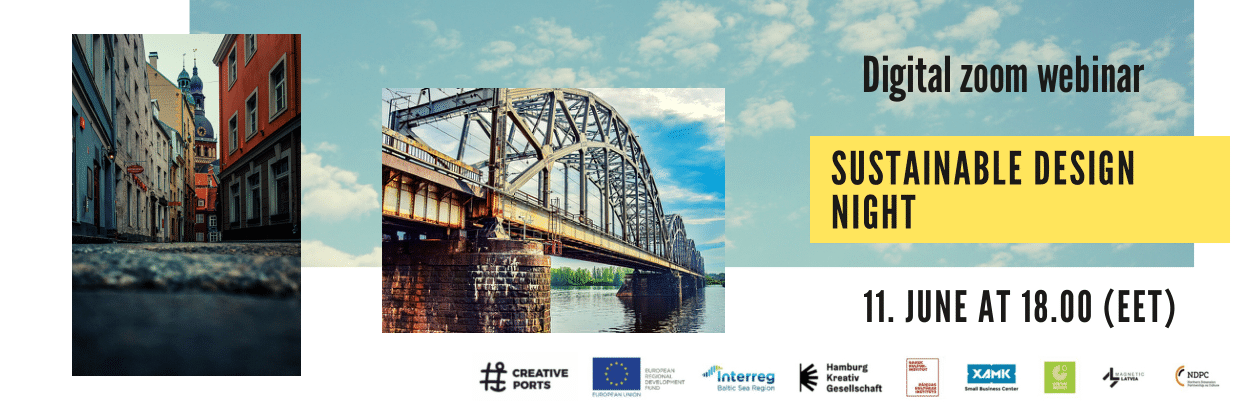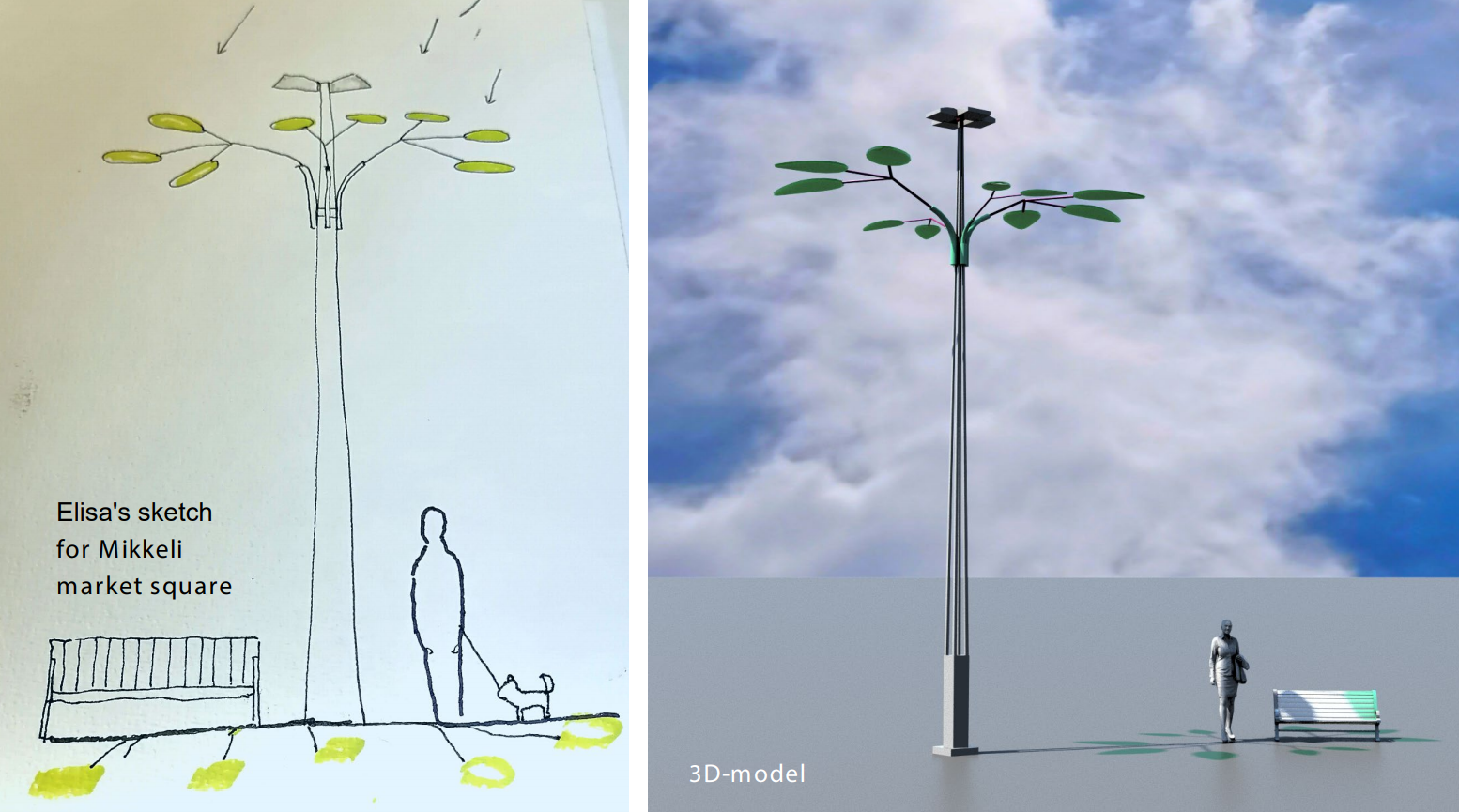Tool 9: Sustainable Design Lab

Idea and Organisation
The Sustainable Design Lab was an international prototyping Lab for designers of different disciplines. It brought together designers from Mikkeli, Riga and Hamburg to jointly build prototypes for sustainable design in three 1.5-day sessions between March and June 2021. The aim was to network and exchange ideas in an international environment by working on prototypes that tackle one of today’s major challenges for design: sustainability.
The organiser of Sustainable Design Lab, Hamburg Kreativ Gesellschaft, supports Hamburg’s creative industry with knowledge, space, financing and innovation. In addition to workshops, lectures and networking events, they also offer individual consulting, coaching, crowdfunding and assistance in financing and finding suitable workspaces. They cater for authors, filmmakers, musicians, visual and performing artists, architects, designers, game developers and other professional groups from the eleven submarkets of the creative industries.
Sustainable Design Lab in Figures
- 13 designers
- 3 countries
- 3 hosts
- 5 prototypes
Aim and Target Group
A central aim of the Sustainable Design Lab was to encourage idea exchange in sustainable design among companies and individual designers. Furthermore, the aim was to demonstrate digital collaboration tools, benefit from working in an interdisciplinary and international peer group and educate designers on entering the global design market.
In addition to the aims above, the Sustainable Design Lab focused on using design to develop sustainable cities. It therefore directly contributed to reaching the UN Sustainable Development Goals (SDGs), particularly goal 11 - Sustainable Cities and Communities.
For intermediary organisations, the Sustainable Design Lab presented an opportunity to gather new insights on workshop methods and the use of technology.
Participating designers naturally expanded their network in the Baltic Sea region by collaborating with different international designers, getting to know CCI support organisations, experts and local companies.
The Program
The Sustainable Design Lab took place in three sessions. The first two brought together five designers from every region in national groups. They worked digitally in interdisciplinary teams on ideas and prototypes to tackle the given challenge related to SDG 11. Although the designers were situated in their home countries, they were connected virtually to the other participating regions through online workshops and inspiration sessions. At the third meeting, participants received pitching advice and a presentation of the prototypes organised by the partner organisation, the Danish Cultural Institute in Riga.
The organisers conceptualised the program to build capacities through workshops and keynotes as well as peer learning. The focus was on circular design methods and international collaboration to advance the development of sustainable cities.
Intermediaries and local companies gave keynote presentations to inform the participants about entering new markets. At the end of the program, the presenters introduced participants to funding opportunities to develop their prototypes.
Event schedule
BLOCK 1
Friday / 19 March
- Welcome & Getting to know each other
- Introduction to SDG11 ‘Sustainable Cities & Communities’
- Presentation: pre-recorded video portraits of the three cities. Focus on the challenges and best practices around SDG 11
- Short discussion and Q&A after each portrait
- Collaboration on Miro.com to gather thoughts, input and first ideas
- Check-out
Saturday / 20 March
- Check-in & warm up
- Input: Design Market in Hamburg (Frances Uckermann, Head of designxport Hamburg)
- Input: What is circular thinking? + Circular Design Strategies (Torben Lohmüller, DarkHorse)
- Workshop: Circular design practice in action, focus on stakeholder analysis & systems mapping
- Project planning in teams
- Check-out/Next steps
BLOCK 2
Friday / 7 May
- Check-in / Warm-up exercise
- Input: The Design Market in the Mikkeli Area
- Recap last workshop & team building
- Group work: Further development of the ideas in the working teams and prototyping planning
- Concert by Paula Tebbe (digital via SofaConcerts)
Saturday / 8 May
- Presentation of ideas and plans for the day by each group and feedback
- Group work: Prototyping in the working teams
- Progress-check and feedback
BLOCK 3
Friday / 10 June
- Check-in, Warm-up (focus Riga)
- Input: The Design Market in Riga (Inese Baranovska, Museum of Decorative Arts and Design)
- Pitching workshop by Kaspars Eglītis
- Sustainable Design Night (invitation-only-event on Zoom Webinar)
- Presentations of the prototypes, 5 x 10 minutes: 7 min presentation, 3 min questions
- Keynote by Emīls Rode, specialist in strategy, design, and innovation
- Networking on Wonder
Saturday / 11 June
- Check-in, Recap final event
- Inspirational talk from: Aigars Lauzis, ZELTINI design & prototyping workshop
- Reflection: Learning journey
- Presentation: International funding opportunities related to Sustainable Design
- Discussion: Continuation of the projects
Communication
All communication was shared through the three hosting partners as well as Creative Ports. The main channels were web, LinkedIn, Instagram and newsletters from all three partners. The communication used visuals to highlight the topic of “Sustainable Cities and Communities”.
The communication strategy focussed on three main topics:
- Open call for participating designers
- The final event (by invitation only)
- The experience of the designers.
(video and interviews with the designers after finishing the lab).

Testimonials From Participants
“During the workshop I really enjoyed working in an interdisciplinary team and exchanging ideas and thoughts and thinking and learning about circular design. It was a great pleasure and I enjoyed it a lot!”
“The whole experience during Sustainable Design Lab reminded me how to play. I really enjoyed the prototyping process and of course it also underlined that we as designers and architects, design spaces and places for people and it should be done in the least harmful way.”
Lessons Learnt
Expectation management is critical, be clear on what you expect from participants and devote some time to negotiating expectations.
It remains problematic to mix workshops, networking and high-quality projects with limited time. Instead, it’s better to focus on one or two goals and outputs, which makes it easier for participants to understand the programme and tackle expectations.

Prototyping digitally is a challenge and requires time. In online formats, meetings need to be shorter and more frequent. A good facilitator is always needed.